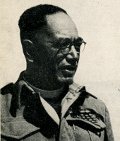
Padre Harawira continues with a final update on the activities of the Māori Battalion during December 1941.
The officers of the Māori Battalion at this time are all young and except for the commanding officer, Colonel Dyer, are all Māori. The final days in battle before Christmas were difficult, with many casualties and a service was held for those who had been killed in the recent battles. On Christmas day the Battalion had a huge feast - a hangi with all kinds of Māori food sent from home, including Patriotic parcels. In early January Padre Harawira visited injured Māori Battalion soldiers in hospitals across Egypt.
This recording is the final part of a broadcast made by the Māori Battalion about the Libyan campaign. It was primarily directed at the Battalions' people at home in New Zealand.
Transcription
[Macrons are not shown as users have the advantage of listening to the recording to see which vowels require emphasis.]
Kua kite mai koutou e te iwi kua tamariki anake nga kaihautu i te waka nei. Kua Maori katoa hoki. Kotahi ano te Pakeha inaianei, ko te kanara. Me aha? He mokopuna na o ratou tipuna. Ka pu te ruha, ka hao te rangatahi. No tekau ma rima o nga ra, ka whakaekengia te paati noa uaua o te hoariri. No te po te tekau ma ono ka taea. No konei te hinganganui o te whanau. Engari no konei ano hoki te whatinga nui o te hoariri me te whakaotinga hoki o te mahi whakaritea ma nga Niu Tireni katoa. Tae rawa mai nga Poles ki te mau i ite pakanga, kore rawa i kitea kei hea te hoariri. No te tekau ma whitu o nga ra ka whakanga te whanau, ka huihui hoki. Tekau ma iwa o nga ra, ka whakahaeretia te karakia mo nga mea i hinga. No te rua tekau ma toru ka timata ta matou hoki mai. Kirihimete mai ki te rori. No te rua tekau ma iwa o nga ra o Tihema ka tutuki matou ki te wahi haere atu ai. I te ra o te Nuia katahi ano te hakari o te kirihimete; nga hangi poaka, tuna, kumara, titi, otira nga kai Māori katoa i tukua mai na e koutou. Ka tae katoa mai ano hoki nga pahara a te patriotic. E rua i te tangata kotahi. No te wha o nga ra o Hanuere ka haere mai matou ki konei. No te rima ka tae mai. No te whitu o nga ra ka haere ahau kia kite i nga mea i tu kei nga hohipera maha o Ihipa e takoto haere ana. Tata tonu ki te rau nga mea i kite au. Ka nui te ora. He mamao nga hohipera o etahi. Engari ka nui katoa te ora. Kei te whakawhaititia mai ratou inaianei ki nga hohipera o Nu Tireni. Tena koutou, tena koutou. E Api, tena koe. Paraire, kua panuitia o mihi. Pihopa o Aotearoa kua rongo atu matou i o mihi mai. Ma te Atua tatou katoa e manaaki, e tiaki, a koutou i kona, a matou hoki i konei, tena koutou.
Translation
People, you will be aware the officers of the Battalion are [now] only young men. They are also all Māori. There is only one European now, the colonel. They are the grandchildren of their ancestors. The old net is cast aside, the new net goes fishing. On 15 [December 1941] we ascended the enemy's stronghold. It was here we suffered heavy casualties. But it was also here that the enemy broke and the offensive by all the New Zealanders ended. The Poles (i.e. Polish) took over but could not find the enemy anywhere. On the 17th the Battalion rested and regrouped. The 19th we held a memorial service for our fallen comrades. On the 23rd we set out on our return journey [to Egypt]. Christmas was spent on the road. On 29th December we reached our destination. On New Years Day we got to have our Christmas meal; pork cooked in a hangi, eel, sweet potato, muttonbird, indeed all the food that you all have sent us. Also all the patrotic parcels have arrived. Two for each man. On 4th January we moved to were we are now. We arrived on the 5th. On the 7th I visited the wounded laid up in the many hospitals of Egypt. I saw close to one hundred. They are well. The hospitals that some are in are far away. But they are all doing well. They are now being transferred to the New Zealand hospitals. Greetings, greetings to all. O' Api, regards to you. Paraire, we have read your message of greeting. Bishop of Aotearoa we have heard you well-wishes. May God look after and protect us all, you over there [in New Zealand] and us here also, geetings.
Sound file from Ngā Taonga Sound & Vision, ref: 15334. Any re-use of this audio is a breach of copyright.
Image: M. L. Underhill et al., 1950, New Zealand Chaplains in the Second World War, War History, p.30

Takupu (0)